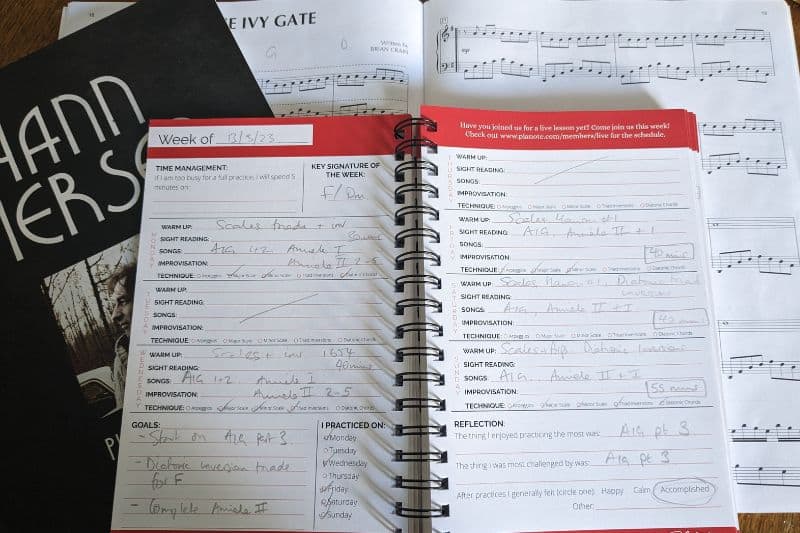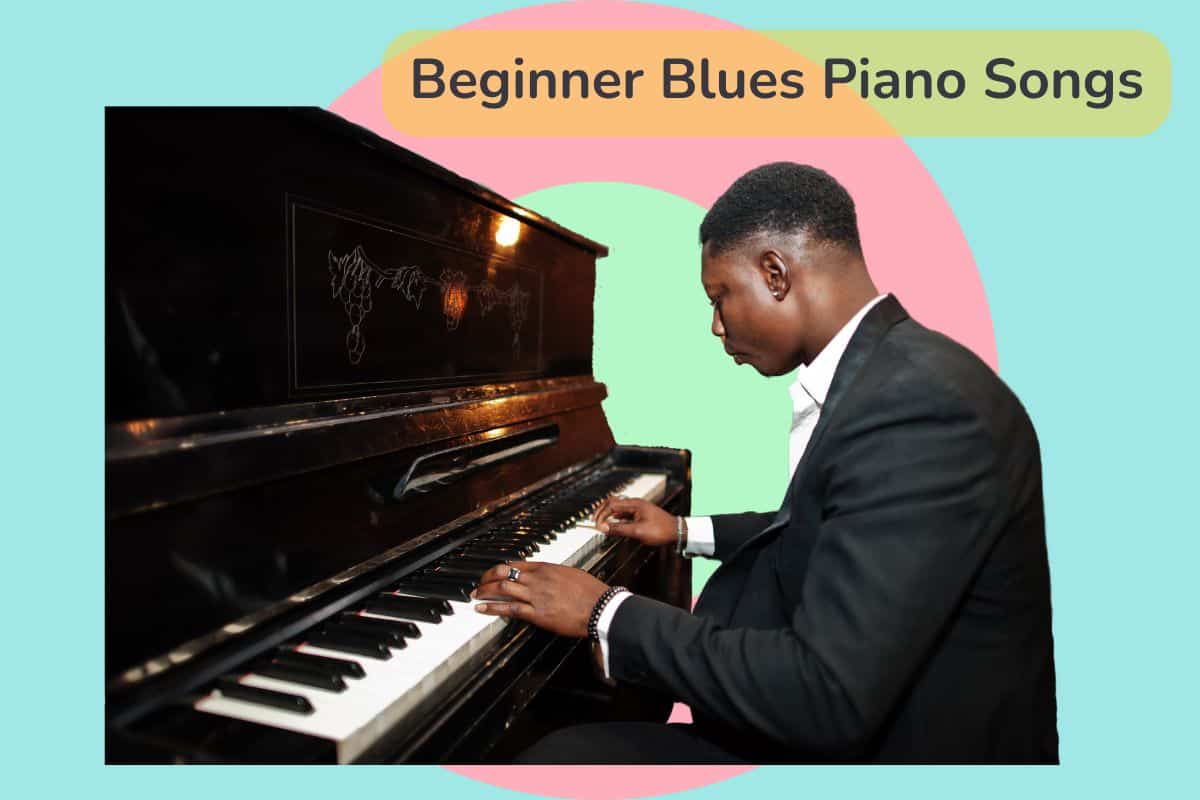Are you a beginner piano player wondering how long you should practice daily? You’re not alone. Many beginners need help finding the right balance between practice time and rest. The truth is, there is no one-size-fits-all answer to this question. It depends on several factors, including age, skill level, and personal goals.
For young children (around four to six years of age), 15 to 20 minutes of supervised piano practice is good. For older beginners, you should start by practicing for about 30 minutes per day, 5 or even 6 days a week.

When starting out, your main goal will be to build a foundation of proper technique and posture. As your skills improve, you can increase your practice time up to 4 hours per day.
However, it’s important to remember that quality practice is more important than quantity. Also, everyone will earn at their own pace, and what works for one person may not work for another.
In this article, we will explore general guidelines for how long beginners should practice the piano. We’ll also include why practice is so important, some tips, and a video from Lisa @Pianote with a fun practice routine for those who don’t know where to start!
Why Regular Practice is Essential for a Beginner
Learning to play the piano can be a fun and rewarding experience, but it also requires a lot of time and effort. One of the most important things for a beginner is establishing a regular practice routine. Here are a few reasons why:
- Builds muscle memory: Regular practice helps to build finger strength and muscle memory, which is essential for playing the piano. When you practice regularly, your fingers will become more accustomed to the keys, and you can play more smoothly and accurately.
- Improves focus: Practicing the piano requires a lot of mental focus and concentration. By practicing regularly, you will enhance your ability to concentrate and stay focused for longer periods of time.
- Develops good habits: Regular practice helps to create good habits, such as proper hand position, posture, and finger placement. These habits are essential for playing the piano correctly and avoiding injury.
It’s important to remember that regular practice doesn’t mean practicing for hours on end every day. For beginners, you should build up your stamina gradually.
Shorter practice sessions of 15 to 30 minutes daily can be as effective as longer sessions. The key is to practice consistently and make the practice focused and deliberate, even if it’s just for a short amount of time each day.
By establishing a regular practice routine, you can build a strong foundation for piano playing and set yourself up for success in the future.
Setting a Practice Goal
No matter where you are on your piano journey, setting a practice goal is essential to help you stay motivated and focused on your progress.
As a beginner, committing yourself to practice 5 or 6 days a week is a great start.
When setting your practice goal, consider the following:
- Consistency: Aim for daily practice to build a strong foundation and make practicing a habit.
- Quality: Focus on an efficient method by identifying and working on challenging areas.
- Flexibility: Recognize your personal and external constraints and adjust your goals accordingly.
Remember that personal growth is the key, so keep reassessing and adjusting your practice goals as you develop your piano skills.
Setting a Practice Schedule
Daily Practice Time
Setting a daily practice time is crucial for beginners to establish a routine and build good habits.
I like to practice in the evening, after eating when the rest of the family is chilling out.
You can break up practice time into shorter sessions to help maintain focus and keep the mind fresh. For instance, practicing for 15 minutes, taking a 5-minute break, and then practicing for another 15 minutes can be an effective way to structure practice time.
Weekly Practice Time
In addition to daily practice time, setting yourself a weekly guide can help you stay on track and make progress. Beginners should practice for at least 2-3 hours per week, divided into shorter daily practice sessions over 5 or 6 days.
You can increase your practice time to 4-5 hours per week as you progress.
As mentioned before, it’s essential to be consistent with practice time and not skip sessions. Setting a specific practice schedule can help prioritize and address practice time. For example, setting aside a particular time of the day.
Also, make sure you practice for each of your allocated days, even if you have a busy day and it’s only 5-10 mins.
Remember, the key to making progress is consistency and dedication. By setting daily and weekly targets, you can achieve a deliberate practice schedule. Here beginners can build good habits and make steady progress in their piano playing.
Tips for Effective Practice

Make the Practice Fun
Learning to play the piano can be challenging, especially for beginners. One way to make practice sessions more enjoyable is to choose music that you love. You can also try playing along with your favorite songs or experimenting with different genres.
Another way to make practice fun is to set goals and reward yourself when you achieve them. For example, you can treat yourself to a favorite snack or take a break to watch a short video after completing several practice sessions.
Breaking Up Practice Sessions
It’s important to remember that practice doesn’t have to be done all at once. In fact, breaking up practice sessions into smaller chunks can be more effective than practicing for long periods.
For beginners, you can practice for 10-15 minutes at a time, two to three times daily. This will help you stay focused and avoid burnout. Set a timer to keep track of your practice time and take short breaks between sessions.
Focusing on Specific Skills
Focusing on specific skills is essential when practicing the piano rather than trying to master everything at once. For example, if you’re struggling with a particular chord or technique, spend some time practicing that skill until you feel more confident. You can also break down a piece of music into smaller sections and practice each separately before putting it all together. This will help you improve your overall playing ability and build your confidence.
Using a Practice Planner
Ok, hear me out on this one, but this one thing is a game changer, no matter where you are on your piano learning journey. And that’s keeping a journal/diary/tracker, or whatever you want to call it.
Using a practice diary can significantly help with the learning process and give you several other benefits, including:
- Tracking progress: By recording what you have practiced, how long you have practiced, and any challenges you have faced, you can see how far you have come and identify areas where you need to improve.
- Setting goals: Setting specific goals and focusing on things you can control, you can then work towards achieving those targets.
- Enhancing focus and discipline: Keeping a practice diary can help you stay focused and disciplined in your sessions. You can develop good habits and avoid distractions by setting aside dedicated time for practice and tracking your progress.
- Identifying patterns and trends: A practice diary can help you identify patterns and trends in your playing. For example, you may notice that you need help with a particular type of passage or that you rush through certain sections. You can address these patterns and improve your playing by identifying them.
Beginners Piano Practice Routine Video
So, as I mentioned earlier, here’s a video from renowned piano teacher Lisa Witt @Pianote, who gives a short and sweet practice routine to complete beginners to get used to playing piano.
If you haven’t heard of Pianote before then, you should check them out (full review coming). They break down all the concepts of learning piano into short, bite-sized, fun, and enjoyable videos.
What I particularly like about the Pianote Method is you’ll be playing songs before you need to read music!
Signs of Progress
When you’re learning the piano, you’ll want to see some results and know that all the effort is paying off. Here are a few things that will tell you that you’re on the right track:
- Improved Hand Coordination: Developing the ability to play different melodies and rhythms with each hand is a crucial piano skill. If you notice this becoming easier, it’s a sign you’re progressing well.
- Faster Sight-Reading: As a beginner, reading sheet music may be challenging, but with consistent practice, you’ll soon find yourself reading and playing songs more fluently.
- Better Technique: Developing proper posture, finger positioning, and hand movement are essential for piano playing. If these aspects improve, you’re on the right track.
- Increased Repertoire: The more songs you can play comfortably, the more experienced you’ll become as a pianist. Continuously learning new pieces showcases your musical growth.
- Enhanced Musicality: Developing your sense of dynamics, phrasing, and timing is vital for turning notes on a page into beautiful music. As you progress, you’ll notice an improvement in your ability to express emotions through playing.
Celebrating these milestones is essential, as they motivate you to keep practicing and honing your skills. Remember, consistency is vital, and with dedication, you’ll continue to see progress on your piano journey.
Overcoming Practice Challenges
You may face several challenges in your piano practice journey as a beginner. Let’s explore how to tackle these obstacles:
Staying Motivated
- Consistency is crucial to progress.
- Play songs that you enjoy as well as challenge you.
- Set achievable goals that you can control and break them into smaller milestones.
- Reward yourself when reaching those milestones.
- Track your progress and celebrate improvements.
- Remember that practice brings progress, so stay patient and positive. Accept challenges and learn ways to overcome them.
Managing Fatigue
- Listen to your body.
- Don’t push too hard.
- Prioritize quality over quantity.
- Avoid long practice sessions without breaks.
- Gradually increase your practice time as you become comfortable.
- Addressing these challenges will make practicing the piano more enjoyable, and you will achieve better results.
Is the Time it Takes to Learn Piano Dependent on the Amount of Practice?
The time it takes to learn piano basics is heavily dependent on the amount of practice you put in. Consistent practice is crucial for mastering piano skills. The more time and effort you devote to practice, the faster you can progress. Dedication, discipline, and regular practice routines are key factors in learning piano efficiently.
Final Thoughts
To effectively learn the piano as a beginner, it’s crucial to understand your individual needs and capabilities. Aim for a consistent daily routine that suits your lifestyle.
Picking up a new instrument can be challenging, but remember that progress comes from regular, deliberate practice. As you advance, you might spend 1-3 weeks on a particular piece or even increase your practice time as your skill level grows.
Ultimately, learning the piano is a journey that requires patience, dedication, and a positive mindset. Keep up the momentum; you’ll soon notice progress and increased enjoyment in playing this beautiful instrument!



